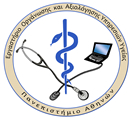Symptoms
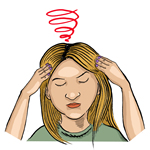 1. Severe headache 1. Severe headache
|
| |
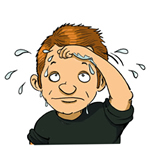 2. Fever 2. Fever
|
| |
 3. Malaise 3. Malaise
|
| |
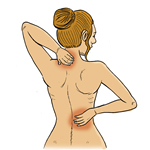 4. Muscle, joint or extremity pain 4. Muscle, joint or extremity pain
|
| |
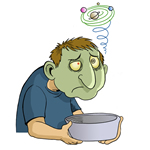 5. Nausea 5. Nausea
|
| |
 6. Vomiting 6. Vomiting
|
| |
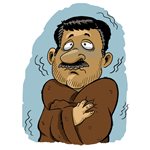 7. Unusually cold hands and feet or chills 8) Pale or blotchy skin and blue lips 7. Unusually cold hands and feet or chills 8) Pale or blotchy skin and blue lips
|
| |
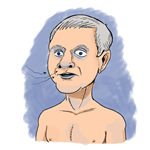 8. Pale or blotchy skin and blue lips 8. Pale or blotchy skin and blue lips
|
| |
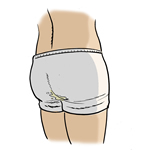 9. Diarrhea 9. Diarrhea
|
As the condition progresses:
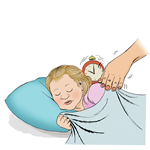 1. Sleepiness 1. Sleepiness
|
| |
 2. Confusion 2. Confusion
|
| |
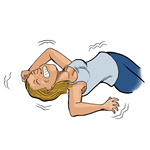 3. Seizures 3. Seizures
|
| |
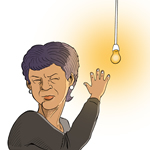 4. Photophobia (sensitivity to bright light) 4. Photophobia (sensitivity to bright light)
|
| |
 5. Stiff neck 5. Stiff neck
|
| |
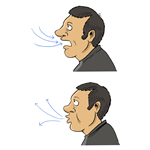 6. Rapid breathing 6. Rapid breathing
|
| |
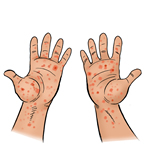 7. A blotchy red rash that does not fade or change color with pressure (not always) 7. A blotchy red rash that does not fade or change color with pressure (not always)
|
| |
Symptoms in babies and toddlers:
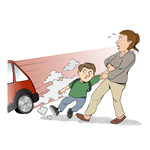 1. Slow or no reactions at all 1. Slow or no reactions at all
|
| |
 2. Irritable reactions 2. Irritable reactions
|
| |
 3. Vomiting and refusal to eat 3. Vomiting and refusal to eat
|
| |
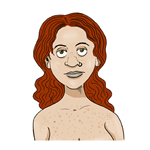 4. Pale color with spots 4. Pale color with spots
|
| |
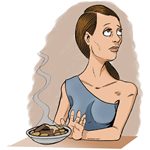 5. Loss of appetite 5. Loss of appetite
|
| |
 6. Sleepiness and refusal to wake up 6. Sleepiness and refusal to wake up
|
| |
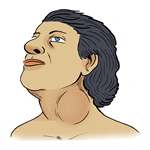 7. Some babies present swelling in the soft part of their head 7. Some babies present swelling in the soft part of their head
|
Transmission
Meningitis can be spread by close and prolonged contact from person to person through droplets from the mouth or nose. Possible ways of transmission:
- sneezing
- cough
- kissing
- sharing items such as utensils, toothbrush, cigarettes
- living in a crowded environment such as nursery schools, schools, universities, student campuses, military camps, ships
Meningitis may also be transmitted by:
- contact with a contaminated surface or object, when a person does not thoroughly wash hands
- touching hands and mouth
- via the feces
- from the secretions of mice and through contact with contaminated dust
- during childbirth from the mother to her baby
Treatment
Patients with symptoms of meningitis should seek medical help immediately! In severe cases of meningitis, patients may require admission in an intensive care unit.
Prevention
-
Αvoid close contact and exposure to droplets
-
Avoid crowding in working places, schools, military camps and ships
-
Wash your hands thoroughly with soap and water before having a meal or before the preparation of a meal, as well as after using the restroom or after diaper change in children (wash the hands of the child as well as of the adult care-giver)
-
Frequent and thorough hand washing (for at least 15-20 seconds) of patients with diarrhea as well as of their care-giver's hands
-
Keep places less crowded and well ventilated
When to seek medical advice
If you observe symptoms of meningitis, in particular in young children, seek medical help immediately! If you have come into close and prolonged (>8 hours) contact with a patient or his respiratory secretions, seek medical advice immediately because you may need to take antibiotics.
Vaccines
There are some vaccines available, but not for all the meningitis bacteria. In Greece there is a vaccine for meningitis C available, administered in 2 doses in young children before the age of 1 year and one booster dose when they are older than 12 months, or one dose in children over one year old as well as a vaccine administered to children over 11 years. With regards to viral meningitis, there are available vaccines for the prevention against the viruses of poliomyelitis, measles, mumps, chickenpox, influenza, rabies and several other viruses (japanese encephalitis virus, tick encephalitis).
References
keelpno
nhs
cdc
















